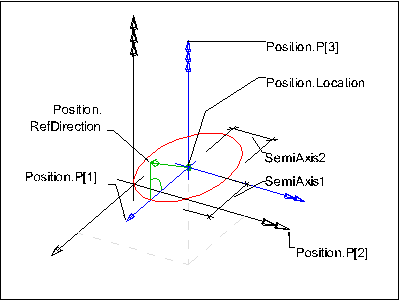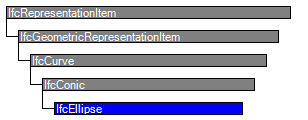Natural language names
 | Ellipse |
 | Ellipse |
 | Ellipse |
Semantic definitions at the entity
Entity definition
An IfcEllipse is a curve consisting of a set of points whose distances to two fixed points add to the same constant.
The inherited SELF\IfcConic.Position.Location is the center of the IfcEllipse, and the inherited S_ELF\IfcConic.Position.Position.P[1]_ is the direction of the SemiAxis1.
 |
Definition of the IfcEllipse within the a three-dimensional position coordinate system is shown in Figure 365. It is placed within the object coordinate system of an element of which it is a representation. |
|
Figure 365 — Ellipse placement and parameterization |
NOTE An elliptical arc segment is defined by using the IfcTrimmedCurve with BasisCurve
NOTE Definition according to ISO/CD 10303-42:1992
An ellipse is a conic section defined by the lengths of the semi-major and semi-minor diameters and the position (center or mid point of the line joining the foci) and orientation of the curve. Interpretation of the data shall be as follows:C = position.location x = position.p[1] y = position.p[2] z = position.p[3] R1 = semi axis 1 R2 = semi axis 2and the ellipse is parameterized as:
The parameterization range is 0 ≤ u <≤ 2π (0 ≤ u ≤ 360 degree). In the placement coordinate system defined above, the ellipse is the equation C = 0, where
The positive sense of the ellipse at any point is in the tangent direction, T, to the curve at the point, where
NOTE Entity adapted from ellipse defined in ISO 10303-42
HISTORY New entity in IFC1.0
Attribute definitions
| # | Attribute | Type | Cardinality | Description | G |
|---|---|---|---|---|---|
| 2 | SemiAxis1 | IfcPositiveLengthMeasure | The first radius of the ellipse which shall be positive. Placement.Axes[1] gives the direction of the SemiAxis1. | X | |
| 3 | SemiAxis2 | IfcPositiveLengthMeasure | The second radius of the ellipse which shall be positive. | X |
Inherited definitions from supertypes
Entity inheritance

Attribute inheritance
| # | Attribute | Type | Cardinality | Description | G |
|---|---|---|---|---|---|
| IfcRepresentationItem | |||||
| LayerAssignment | IfcPresentationLayerAssignment @AssignedItems | S[0:1] | Assignment of the representation item to a single or multiple layer(s). The LayerAssignments can override a LayerAssignments of the IfcRepresentation it is used within the list of Items.
IFC2x3 CHANGE The inverse attribute LayerAssignments has been added. IFC4 CHANGE The inverse attribute LayerAssignment has been restricted to max 1. Upward compatibility for file based exchange is guaranteed. | X | |
| StyledByItem | IfcStyledItem @Item | S[0:1] | Reference to the IfcStyledItem that provides presentation information to the representation, e.g. a curve style, including colour and thickness to a geometric curve.
IFC2x3 CHANGE The inverse attribute StyledByItem has been added. | X | |
| IfcGeometricRepresentationItem | |||||
| IfcCurve | |||||
| Dim :=IfcCurveDim(SELF) | IfcDimensionCount | The space dimensionality of this abstract class, defined differently for all subtypes, i.e. for IfcLine, IfcConic and IfcBoundedCurve. | X | ||
| IfcConic | |||||
| 1 | Position | IfcAxis2Placement | The location and orientation of the conic. Further details of the interpretation of this attribute are given for the individual subtypes." | X | |
| IfcEllipse | |||||
| 2 | SemiAxis1 | IfcPositiveLengthMeasure | The first radius of the ellipse which shall be positive. Placement.Axes[1] gives the direction of the SemiAxis1. | X | |
| 3 | SemiAxis2 | IfcPositiveLengthMeasure | The second radius of the ellipse which shall be positive. | X | |
Formal representations
XML Specification
<xs:element name="IfcEllipse" type="ifc:IfcEllipse" substitutionGroup="ifc:IfcConic" nillable="true"/>
<xs:complexType name="IfcEllipse">
<xs:complexContent>
<xs:extension base="ifc:IfcConic">
<xs:attribute name="SemiAxis1" type="ifc:IfcPositiveLengthMeasure" use="optional"/>
<xs:attribute name="SemiAxis2" type="ifc:IfcPositiveLengthMeasure" use="optional"/>
</xs:extension>
</xs:complexContent>
</xs:complexType>
EXPRESS Specification
ENTITY IfcEllipse
SUBTYPE OF (IfcConic);
SemiAxis1 : IfcPositiveLengthMeasure;
SemiAxis2 : IfcPositiveLengthMeasure;
END_ENTITY;



 EXPRESS-G diagram
EXPRESS-G diagram Link to this page
Link to this page